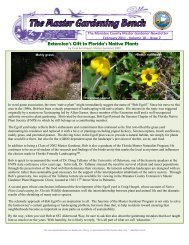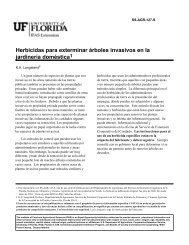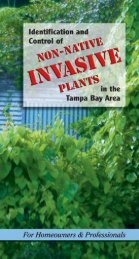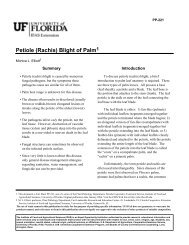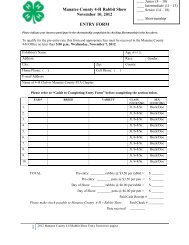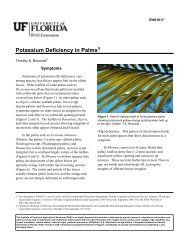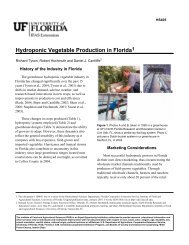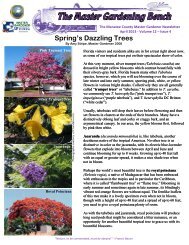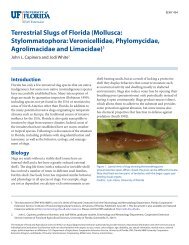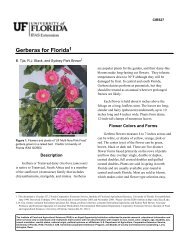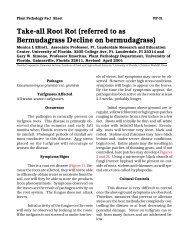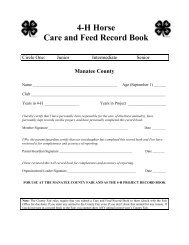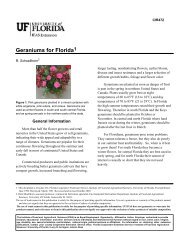Plant Selection & Landscape Design - Southwest Florida Water ...
Plant Selection & Landscape Design - Southwest Florida Water ...
Plant Selection & Landscape Design - Southwest Florida Water ...
Create successful ePaper yourself
Turn your PDF publications into a flip-book with our unique Google optimized e-Paper software.
The Nine <strong>Florida</strong>-Friendly Landscaping Principles<br />
The nine <strong>Florida</strong>-Friendly Landscaping principles are<br />
the cornerstone of the <strong>Florida</strong>-Friendly Landscaping<br />
Program. Based on UF/IFAS science, the principles teach<br />
homeowners, builders and developers, landscape maintenance<br />
professionals, and other <strong>Florida</strong> citizens how to<br />
implement environmentally sound design and maintenance<br />
techniques in their landscapes. The principles are outlined<br />
briefly here. For more detailed information, please refer to<br />
the FFL state office Web site (http://fyn.ifas.ufl.edu) or to<br />
The <strong>Florida</strong> Yards & Neighborhoods Handbook.<br />
PRINCIPLE #4: MULCH<br />
<strong>Florida</strong>-Friendly Landscaping methods recommend<br />
using mulch to protect against soil erosion, maintain soil<br />
moisture, inhibit weed growth, improve soil structure<br />
and aeration, and reduce pesticide use. A <strong>Florida</strong>-<br />
Friendly <strong>Landscape</strong> will feature one of the types of<br />
mulch recommended in The <strong>Florida</strong> Yards &<br />
Neighborhoods Handbook in its planting beds.<br />
PRINCIPLE #1: RIGHT PLANT, RIGHT PLACE<br />
<strong>Plant</strong>s well-suited to their site need less irrigation and fertilizer<br />
and are more resistant to pest infestation. <strong>Florida</strong>-Friendly<br />
Landscaping principles encourage the selection of the right<br />
plant for the right place, helping you create a healthy, attractive<br />
landscape that works with the natural ecosystem rather<br />
than against it. Match plants with site conditions based on<br />
USDA zone, water and light requirements, soil conditions, salt<br />
and wind tolerance, and other factors. The FFL <strong>Plant</strong> List can<br />
help you make the right plant selections for your landscape.<br />
PRINCIPLE #2: WATER EFFICIENTLY<br />
Overwatering not only depletes water supplies, it raises<br />
your water bill and makes landscapes more prone to pest<br />
infestation. If needed, irrigate plants according to<br />
UF/IFAS-recommended rates and application schedules,<br />
taking into account local restrictions issued by your water<br />
management district. <strong>Water</strong> only when plants show signs<br />
of wilt, preferably in the early morning. Check your irrigation<br />
system regularly for leaks and clogs. Do not water if it<br />
has rained in the past 24 hours, or if rain is forecast in the<br />
next 24 hours. By law you must install, maintain, and<br />
operate a device such as a rain sensor that prevents operation<br />
of your automatic irrigation system during periods of<br />
sufficient moisture.<br />
PRINCIPLE #3: FERTILIZE APPROPRIATELY<br />
If fertilization is needed, use UF/IFAS-recommended rates<br />
and application schedules to get a healthier lawn and garden.<br />
Fertilizing at the correct times and in the correct<br />
amounts not only supplies plants with the nutrients they need,<br />
it helps prevent fertilizer runoff and leaching that can get<br />
into our water supplies and interfere with ecosystem and<br />
human health. Fertilizing at the rates recommended by UF<br />
scientists helps avoid the excessive growth, pest problems,<br />
and higher water requirements that over-fertilization causes.<br />
PRINCIPLE #5: ATTRACT WILDLIFE<br />
<strong>Florida</strong>-Friendly Landscaping encourages Floridians to<br />
make their yards attractive to birds, bees, bats, and other<br />
creatures displaced by rapid urban development. Supply<br />
berry bushes, a bird bath, or a bat house; increase vertical<br />
layering to provide habitat; manage household pets<br />
and reduce insecticide use—all these tricks can welcome<br />
wild visitors in need of refuge. Many of these will return<br />
the favor by eating pest insects and helping to pollinate<br />
your garden!<br />
PRINCIPLE #6: MANAGE YARD PESTS RESPONSIBLY<br />
The <strong>Florida</strong>-Friendly Landscaping Program advocates a<br />
more holistic approach to pest control than merely spraying<br />
chemicals. Integrated Pest Management (IPM) creates<br />
an effective defense against yard pests while minimizing<br />
environmental impact. IPM emphasizes smart planning,<br />
proper maintenance, and natural or low-toxicity controls<br />
to ensure that plants stay healthy and resist disease and<br />
insect infestation. Chemical treatments may still be necessary<br />
in some cases, but use of toxic materials will be<br />
minimized by this approach.<br />
PRINCIPLE #7: RECYCLE<br />
A <strong>Florida</strong>-Friendly <strong>Landscape</strong> recycles yard waste<br />
generated by activities like mowing, pruning, and raking.<br />
Use these leftovers as mulch or compost, returning valuable<br />
nutrients to your landscape. Save money and enrich<br />
your soil by composting grass clippings, weeds, and plant<br />
trimmings and using the compost as an amendment.<br />
A <strong>Florida</strong>-Friendly Landscaping TM Publication<br />
3



